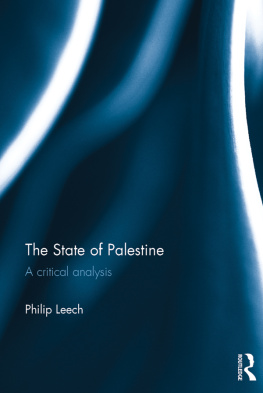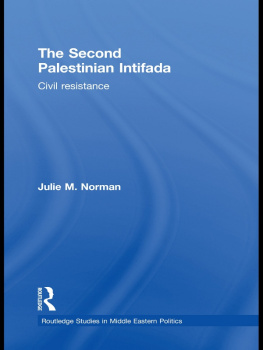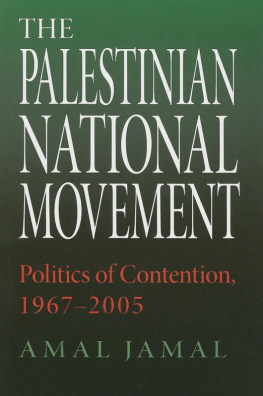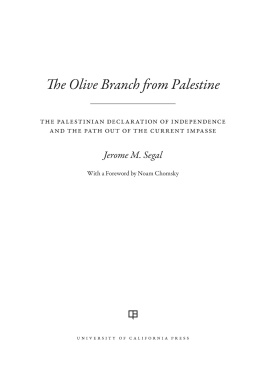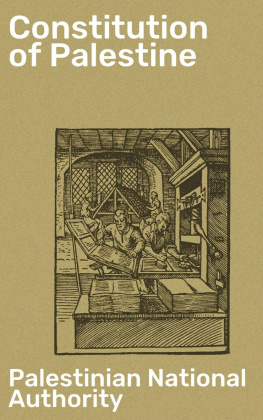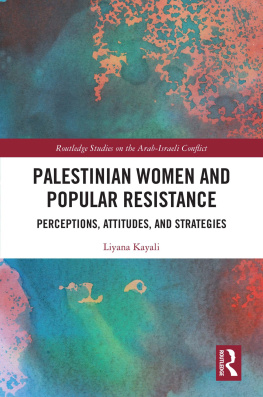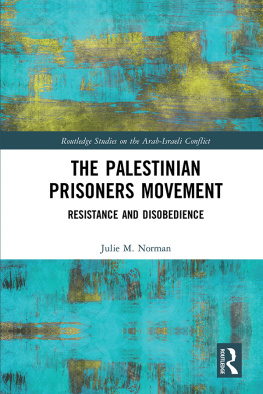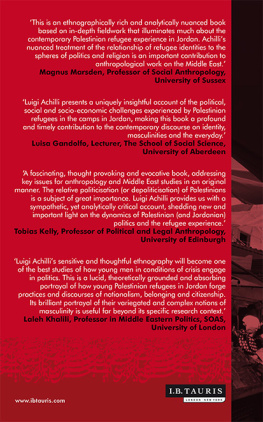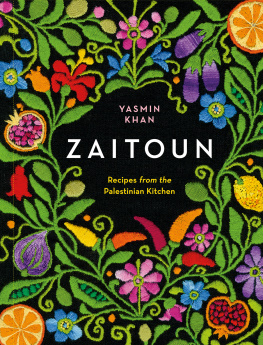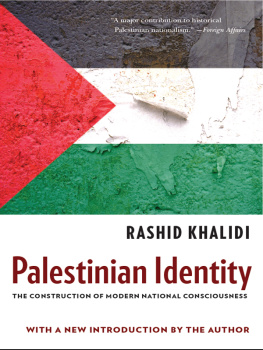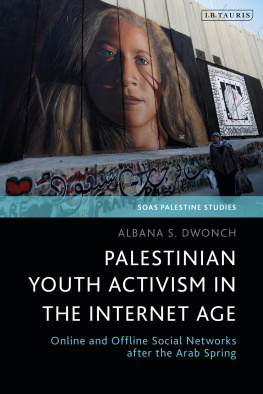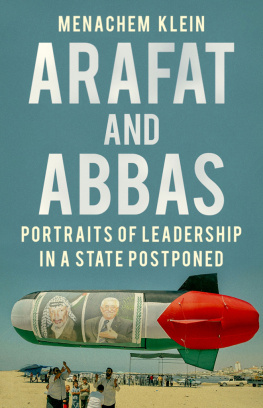The State of Palestine
The Palestinian national movement reached a dead end and came close to disintegration at the beginning of the present century. This critical analysis of internal Palestinian politics in the West Bank traces the re-emergence of the Palestinian Authoritys established elite in the aftermath of the failed unity government and examines the main security and economic agendas pursued by them during that period.
Based on extensive field research interviews and participant observation undertaken across several sites in Nablus and the surrounding area, it provides a bottom-up interpretation of the Palestinian Authoritys agenda and challenges the popular interpretation that its governance represents the only realistic path to Palestinian independence. As the first major account of the Palestinian Authoritys political agenda since the collapse of the unity government, this book offers a unique explanation for the failure to bring a Palestinian state into being and challenges assumptions within the existing literature by addressing the apparent incoherence between mainstream debates on Palestine and the reality of conditions there.
This book is a key addition to students and scholars interested in Politics, Middle-Eastern Studies and International Relations.
Philip Leech is Senior Fellow at the Institute for Government at the University of Ottawa, Canada, and a Visiting Fellow at the Kenyon Institute in Jerusalem. He has a PhD from Exeter Universitys Institute for Arab and Islamic Studies and is the co-editor of Political Identities and Popular Uprisings in the Middle East (2016).
The State of Palestine provides a comprehensive critique of the false messiah of state-building as a strategy for Palestinian emancipation. Based on extensive research in the occupied Palestinian territory, particularly in the city of Nablus, Leech critically assesses 20 years of the Palestinian Authority, but with a focus on the post-2006 era. This book is essential reading for those who wish to understand Palestinian politics today and for why the so-called two-state solution was and remains so fundamentally flawed.
Dr Mandy Turner, Director of the Kenyon Institute in Jerusalem (Council for British Research in the Levant)
The first thorough and scholarly examination of the post-Oslo reality in the West Bank. This careful and forensic study exposes the fallacies surrounding the reality on the ground in the areas under the Palestinian Authority control. A highly important source of information and deconstruction for anyone who wishes genuinely to understand, and change, the dismal reality on the ground in the West Bank and beyond.
Ilan Pappe, Professor of History at the Institute for Arab and Islamic Studies, Exeter University
Drawing upon original fieldwork in the north of the West Bank, Phil Leech provides a meticulous and much-needed critique of the Palestinian Authoritys state building project. This is a fascinating and timely account of Palestinian politics that deserves to be widely read.
Adam Hanieh, Senior Lecturer in Development Studies, the School of Oriental and African Studies, University of London
Leech makes a compelling case that the Palestinian Authoritys and the international communitys statebuilding project in the Occupied Territories never stood a real chance. Extensive engagement with the lived experience of those in cities, villages and refugee camps is married to a grasp of the higher politics and economic models at play. Although accessibly written, this is not a comfortable read, challenging many of the hopeful scenarios politicians and activists have held on to. Laying bare the real dynamics at work, Leechs analysis is a prerequisite for moving beyond the pious hopes and assertions of the past.
Gerd Nonneman, Professor of International Relations, School of Foreign Service, Georgetown University
In this excellent account, Philip Leech goes beyond the rhetoric of countless policymakers and journalists to deliver a meticulous critique of the Palestinian Authoritys doomed statebuilding project. He convincingly demonstrates how a security agenda and a neoliberal economic strategy took precedence over democracy and the path to Palestinian independence.
Rory McCarthy, The Guardians Jerusalem correspondent, 200610
The State of Palestine
A critical analysis
Philip Leech
First published 2017
by Routledge
2 Park Square, Milton Park, Abingdon, Oxon OX14 4RN
and by Routledge
711 Third Avenue, New York, NY 10017
Routledge is an imprint of the Taylor & Francis Group, an informa business
2017 Philip Leech
The right of Philip Leech to be identified as author of this work has been asserted by him in accordance with sections 77 and 78 of the Copyright, Designs and Patents Act 1988.
All rights reserved. No part of this book may be reprinted or reproduced or utilised in any form or by any electronic, mechanical, or other means, now known or hereafter invented, including photocopying and recording, or in any information storage or retrieval system, without permission in writing from the publishers.
Trademark notice: Product or corporate names may be trademarks or registered trademarks, and are used only for identification and explanation without intent to infringe.
British Library Cataloguing in Publication Data
A catalogue record for this book is available from the British Library
Library of Congress Cataloging in Publication Data
Names: Leech, Philip, 1984 author.Title: The state of Palestine : a critical analysis / Philip Leech.Description: New York, NY : Routledge, [2016] | Includes index.Identifiers: LCCN 2016006439| ISBN 9781472447760 (hardback) | ISBN 9781315573649 (ebook)Subjects: LCSH: Palestinian National AuthorityHistory21st century. | West BankHistory21st century. | West BankPolitics and government21st century.Classification: LCC DS119.76 .L435 2016 | DDC 956.95/3044dc23LC record available at http://lccn.loc.gov/2016006439
ISBN: 978-1-472-44776-0 (hbk)
ISBN: 978-1-315-57364-9 (ebk)
Typeset in Times New Roman
by Out of House Publishing
To
Khai-Tr,
Freya,
Arthur, Albert and Audrey,
and
Xeius, Lana, Lilly, Lois and Lucy
Contents
Research for this book began in 2008. Since then, the project has developed, grown and I hope improved a great deal. There are two main reasons for this trajectory. The first is a natural product of learning more and more through my own research and writing. This is partly a result of the welcome advice from more senior colleagues, partly a product of undertaking further research and also partly resulting from simply sitting with the subject and thinking about it for longer, allowing sometimes disparate thoughts to coalesce into more solid ideas.
The second major reason was my strong desire to make this book accessible to a general audience as well as to academics. Obviously this volume remains a fairly focused account of a topic that might, at first, seem quite obscure to most readers. But I hope that this apparent opacity does not cause the reader to underestimate the topics significance. My desire to make this account more accessible was to some extent born out of a sense of urgency of which I became conscious during my first experiences of teaching undergraduate and graduate courses at universities in the UK.

